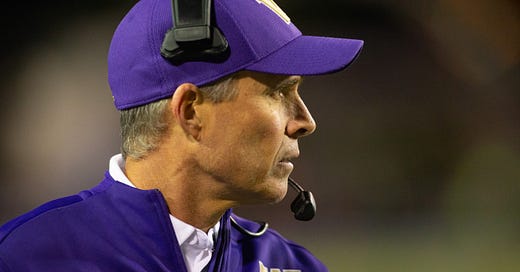Chris Petersen goes deep on life after coaching, Kalen DeBoer, working in TV and the illusion of control
A Q-and-A with Washington's former coach
SEATTLE — I understand that the voice on the other end of the phone belongs to Chris Petersen. And it does sound like Washington’s former football coach.
Just … different.
Looser. Freer. Less stressed. Like a guy who hasn’t performed a single recruiting activity in more than three years.
I reached out to Petersen to get his thoughts on Kalen DeBoer and the new era of Huskies football, and to catch up on what he’s been up to since stepping away in December 2019, including his work with coaches across UW’s athletic department and as a studio analyst for Fox.
The result was an illuminating conversation about perspective, priorities, favorite cliches, his impressions of DeBoer during the coaching search, what sets Washington’s offense apart, and spending Saturdays watching and discussing college football.
Questions and responses have been lightly edited for length and clarity.
When you announced your resignation, you said you needed to figure some things out. What have you figured out? And are you waking up each day feeling the way you want to feel?
I really am. When I stepped away, I really had no idea what I was going to do, if I’d coach again, if I was just tired of coaching. I just knew the path I was on was not correct, and I needed to get clarity. My time at Boise State, toward the end, I had similar feelings, but I could not figure out, like … I’ve got this great job with great kids. Awesome place. We’re doing well. And I’m not doing well. I’m not feeling great. And so the end of my time at Washington was the same thing.
My plan was to go visit a bunch of different places that I kind of had lined up. I look back at it now and I’m like, “what was I going to visit them about?” I wanted to go to places that I thought did a good job with the program, leadership, those types of things. I wanted to go to West Point. I was going to maybe go back to visit the All Blacks [New Zealand’s national rugby team]. And of course COVID hits, and I’m thinking, “just my luck,” like everybody does.
For me, locking me down in my house ended up as a benefit, because I ended up talking to a lot more people that I respected and liked, and sorted through some things. Now, three years later, I’m in a pretty good spot. Those coaching jobs, in college football especially — there’s wonderful things about the job. We all know that. To be with those kids and to be in a place like the University of Washington, just the really cool people you’re surrounded by, and the support you have.
But it is a 24/7, 365 job. Even when I was not there, I was there. Whether that was in the summertime, going on vacation — my mind was still back at the office. You could never detach. You have to be able to recover, like the stress of the job, the grind of the job. You have to be able to recover or you’re just going to have a lot of negativity. “Wait, things are pretty good, but why am I feeling like this is a problem, that’s a problem?”
You can just lose perspective. And when you don’t have a chance to really get away, not only physically but mentally, and recharge and refresh, you can only do that so long.
Is there a discipline or area of study you’ve focused on most?
I work with coaches. That’s what I am doing, is working with coaches, and this crazy environment that they’re in. It’s very interesting for me — whether you’re going to be a consultant for them, or a thinking partner. That’s how I like to think of myself, because I know exactly what they’re going through. And everybody’s at a different place on their journey. On my journey, I was at the end, like, “this just isn’t working, you can’t do this anymore.”
Some are heading there quickly. Some are halfway there. Some are trying to make sense of this. So that is really purposeful work for me, to be able to get with coaches and just have them think through some of those things. I have learned a ton about how to live a more joyful, fulfilling, purposeful life, but you have to have a plan, and you need to fight for this plan. That I do know. Especially in the arena of college athletics and even pro sports.
When you say you’re working with coaches, is that mostly at Washington?





